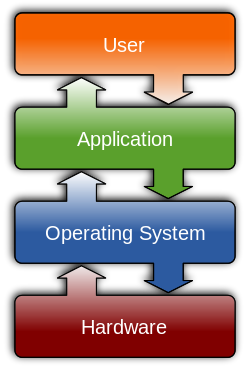Operating system: Difference between revisions
Mr. MacKenty (talk | contribs) No edit summary |
Mr. MacKenty (talk | contribs) No edit summary |
||
| Line 17: | Line 17: | ||
An operating system also provides: | An operating system also provides: | ||
# Tools for managing the operating system. These are often called '''utilities''' or '''system tools'''. [[Media:Linux observability tools.png | Click here for a brilliant graphic showing the different types of tools you can use to view inside the operating system]] | # Tools for managing the operating system. These are often called '''utilities''' or '''system tools'''. [[Media:Linux observability tools.png | Click here for a brilliant graphic showing the different types of tools you can use to view inside the Linux operating system]] | ||
== Different operating systems == | == Different operating systems == | ||
Revision as of 15:08, 1 September 2016
An operating system (OS) is system software that manages computer hardware and software resources and provides common services for computer programs. All computer programs, excluding firmware, require an operating system to function.[1]
An operating system manages:
- Memory
- Processes
- Boot-up / Shutdown process
- Files
- Security
- CPU Scheduling
- Devices, Device I/O
- Interrupts
- The user interface, most often a GUI but also a CLI
An operating system also provides:
- Tools for managing the operating system. These are often called utilities or system tools. Click here for a brilliant graphic showing the different types of tools you can use to view inside the Linux operating system
Different operating systems[edit]
- Linux
- OS X
- WIndows
- iOS
- Android OS
- Google chrome OS (Based on Linux)
Do you understand this topic?[edit]
- Describe the main functions of an operating system.
Do you have an advanced understanding about this topic?[edit]
- Describe how an operating system manages the functions you have just described above.
